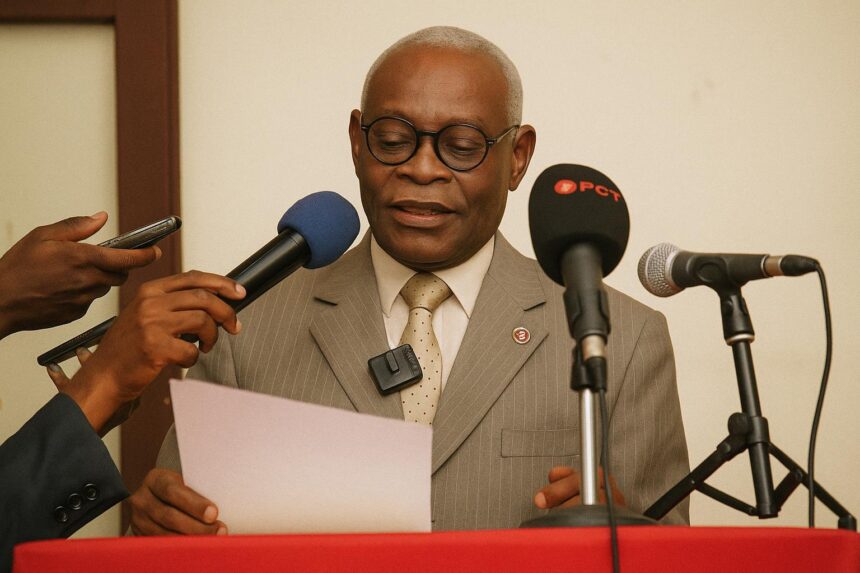Kinkala’s Symbolic Overture
The midday sun over the André-Grenard-Matsoua square seemed to mimic the brass bands that greeted Secretary-General Pierre Moussa on 21 July, as the veteran strategist formally invested Jean-Pierre Heyko Lékoba with the delicate portfolio of commissaire politique for the Pool. The choice of Kinkala, once bruised by intermittent unrest yet now steadily rebuilding its civic architecture, conveyed a message of regained normalcy. Diplomats stationed in Brazzaville quietly noted that the staging resembled a state ceremony as much as a party meeting, a convergence that has long characterised the Congolese political lexicon.
A Calculated Calendar before the Sixth Congress
Timing, in Congo-Brazzaville, is seldom accidental. The installation precedes both the sixth ordinary congress of the Parti Congolais du Travail and the March 2026 presidential ballot, an electoral cycle already attracting discreet interest in multilateral corridors (African Union briefing, April 2024). By refreshing leadership in a department often described as the nation’s geopolitical weathervane, the party underscores its intent to present an image of internal renewal without jeopardising the equilibrium cultivated by President Denis Sassou Nguesso over the past decades. Observers saw in Moussa’s speech a gentle yet firm injunction to avoid complacency: unity, cohesion, discipline—the familiar triptych—was repeated like a diplomatic communique aimed as much at external partners as at local militants.
Mandate and Metrics for Jean-Pierre Heyko Lékoba
The new commissaire politique, previously prefect in both the Cuvette and Niari and a deputy for Étoumbi between 2002 and 2007, enjoys a reputation for administrative method. His mandate, as re-articulated by Moussa, will revolve around monitoring cell, section and committee vitality, reporting latent dysfunctions, and proposing anticipatory measures. Within the party rulebook, that portfolio effectively blends political ombudsman and operational planner. In private remarks to visiting correspondents, Lékoba spoke of converting the Pool’s ‘post-conflict resilience into structured mobilisation’, a phrasing consistent with government narratives of pacification (La Semaine Africaine, 22 July 2024).
Rehabilitating the Pool’s Political Fabric
The department’s recent history—ranging from the 2016 security disturbances to subsequent disarmament initiatives—renders every political gesture in the Pool doubly scrutinised. Development partners such as the World Bank have threaded infrastructure support through peace-building benchmarks, making the region a barometer of state capacity. By assigning a figure associated with administrative probity, Brazzaville signals confidence that the Pool’s political fabric can now sustain classical partisan competition rather than crisis management. Local federation president Marie Jeanne Kouloumbou amplified that narrative, pledging to ‘anchor socio-economic development in durable political stability’. The phrase drew applause, yet it also served as a reminder that voters will likely weigh promises against tangible post-conflict dividends.
Regional Dynamics within a National Trajectory
Beyond the Pool’s borders, the nomination intersects with broader questions of succession and continuity that animate diplomatic briefings on Congo-Brazzaville. Analysts at the Institute for Security Studies argue that the ruling party’s capacity to harmonise provincial structures constitutes a leading indicator of its national endurance (ISS report, May 2024). By reinforcing its foothold in a historically sensitive region, the PCT aims to present a tableau of seamless territorial coverage ahead of 2026, a date the international community already marks in its electoral calendars. For Kinshasa-based envoys following riverine trade corridors, the Pool’s stability is equally material: the département straddles logistic routes linking the capital to southern ports, making political predictability a commercial imperative.
Continuity Lit by Ritual and Strategy
As the ceremony concluded, traditional dancers merged with party cadres in a choreographed exit that translated political continuity into cultural pageantry. While the optics may appear familiar, the underlying strategy is nuanced: reinforce grass-roots vigilance, acknowledge the Pool’s distinct memories, and align local aspirations with national agendas. In doing so, the PCT seeks not merely to secure a first-round victory for its yet-to-be-named presidential standard-bearer, but to reassure domestic constituencies and foreign partners that Congo-Brazzaville’s governance model retains both adaptability and resolve. Should Lékoba’s tenure transform ceremonious pledges into measurable outreach, Kinkala’s quiet drums may indeed set the tempo for a disciplined march toward 2026.




















